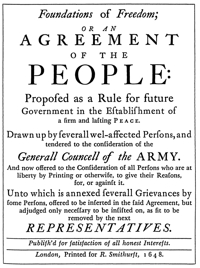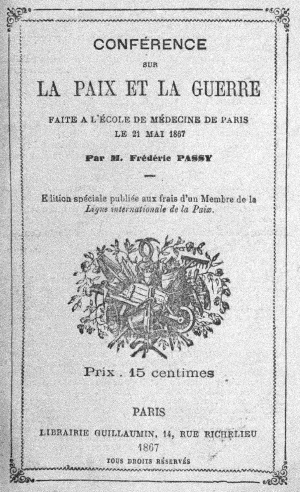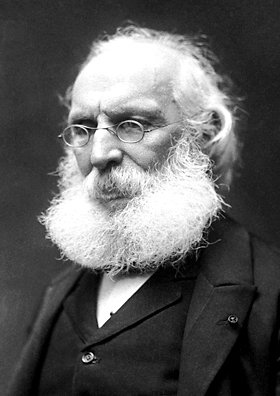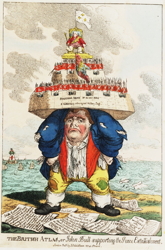
Archive of Material added to the Website
Additions in 2019 |
|
|
Dec. 2019:
Sept. 2019: Libertarian Scholars Conference, NYC, papers:
July 2019: chapter on "The Paris School of Liberal Political Economy" in The Cambridge History of French Thought (CUP, 2019) - a much longer version is here. June 2019: Molinari bicentennial celebrations throughout 2019
April 2019: Paper on "The Conflicted Western Tradition: Some Provocative Pairings of Texts about Liberty and Power" for the Association of Core Texts and Courses annual conference, April 2019, Santa Fe, NM. |
2018 |
|
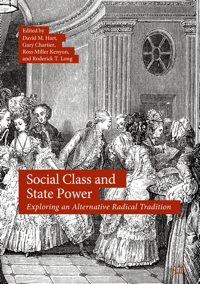 |
|
2017
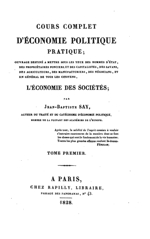 |
Title: Say, Jean-Baptise, Cours complet d'économie politique pratique; ouvrage destiné à mettre sous les yeux des hommes d'état, des propriétaires fonciers et les capitalistes, des savans, des agriculteurs, des manufacturiers, des négocians, et en général de tous les citoyens, l'économie des sociétés (Paris: Rapilly, 1828-9), 6 vols. E-Text: vol. 1 [13.9 MB PDF] - vol. 2 [16.5 MB PDF] - vol. 3 [23.5 MB PDF] - vol. 4 [22 MB PDF] - vol. 5 [14.7 MB PDF] - vol. 6 [21 MB PDF] Comment: This important work by Say has never been translated into English. Date Added: Guillaumin Collection: French Political Economy |
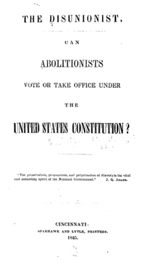 |
Title: Wendell Phillips, The Disunionist, Can Abolitionists vote or take Office under the United States Constitution? (Cincinnati: Sparhawk and Lytle, Printers, 1845). E-Text: [Facsimile PDF] [HTML] Comment: A foundational text for the "voluntaryists" who think it is immoral to vote or to sweath an oath to take office in government. Date Added: 22 Jan. 2017 Guillaumin Collection: Slavery and Abolition |
2014
23. Dec. 26: Bastiat's, Le Libre-Échange (Nov. 1846-April 1848) - Updated
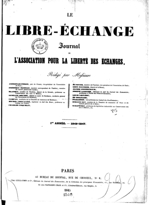 |
Title: Le Libre-Échange. Journal du travail agricole, industriel et commercial. Première année, No. 1: 29 novembre 1846; No. 52: 21 novembre 1847. And Le Libre-Échange. Deuxième année, No. 1: 28 novembre 1848; No. 20: 16 avril 1848. Edited by Frédéric Bastiat and Charles Coquelin. E-Text: 52 issues of the first year and 20 issues of the second year are available in facsimile PDF. [Orignally scanned 2 pages to a page - now reformatted to one page per page]. Comment:The last issue edited by FB was No. 12: 13 février 1848. Subsequent issues were edited by Charles Coquelin as Bastiat became increasingly busy during the revolution, editing and distributing the little magazine La République française and then standing for the April elections to the Constituent Assembly (which he won representing his home district of Les Landes). Guillaumin Collection: French Classical Liberalism |
22. Oct. 28: Le Travail intellectuel (1847-48).
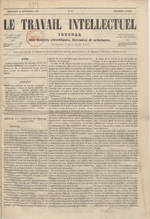 |
Title: Le Travail intellectuel. Journal des intérêts scientifiques, littéraires et artistiques (Paris) 15 Aug. 1847 - 15 Feb. 1848 (7 issues). Rédacteur en chef: Hippolyte Castille, rue Saint-Lazare 79. E-Text: [Facs. PDF 105 MB] Comment: A short lived journal founded by H. Castille and his economist friends such as Bastiat, Molinari, and others. It was designed to defend the idea of the perpetual property rights in ideas. The address of the editorial offices, rue Saint-Lazare 79, was Castille's home where he held a salon. This is where Molinari got the idea for the title of his book Les Soirées de la rue Saint-Lazare (1849). Page 1 of issue no. 1 is missing. Guillaumin Collection: French Classical Liberalism |
21. Oct. 26: Frederick Douglass, Oration (July 5th, 1852).
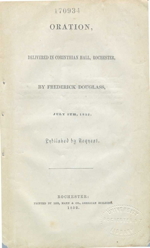 |
Title:Oration, Delivered in Corinthian Hall, Rochester, by Frederick Douglass, July 5th, 1852 (Rochester: Printed by Lee, Mann, and Co., American Building, 1852). E-Text: The speech is available in HTML and facs. PDF 3.9 MB. Comment: Fredercik Douglass is a little appreciated classical liberal who based his defence of freedom solidly on the grounds of self-ownership and the renunciation of corecion. He believed these were universal principles which applied to both African-Americans and women. Guillaumin Collection: Anti-Slavery Writings |
20. Oct. 26: Laisson Faire: : Revue des économistes français (Paris: Institut Coppet)
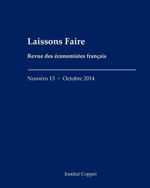 |
Title: Laissons Faire: Revue des économistes français (revue mensuelle de l’Institut Coppet). Rédacteur en chef : Benoît Malbranque, chercheur-associé, vice-président de l’Institut Coppet. Éditeur : Damien Theillier, président de l’Institut Coppet, professeur de philosophie. David M. Hart, Membre du Comité d’honneur. E-Text: <http://www.institutcoppet.org/laissons-faire/archives/> or here [complete backlist with ToC]. Comment: The French classical liberal tradition is alive and flourishing in Paris. The Institut Coppet (named after madame de Staël's château in Switzerland where classical liberals could seek shelter from the wrath of Napoléon) is undertaking a large republishing effort to bring back into print the French classics from the 18th and 19th century. This is their monthly journal. Guillaumin Collection: French Classical Liberalism |
19. Sept. 26: Bastiat's, Le Libre-Échange (Nov. 1846-April 1848)
 |
Title: Le Libre-Échange. Journal du travail agricole, industriel et commercial. Première année, No. 1: 29 novembre 1846; No. 52: 21 novembre 1847. And Le Libre-Échange. Deuxième année, No. 1: 28 novembre 1848; No. 20: 16 avril 1848. Edited by Frédéric Bastiat and Charles Coquelin. E-Text: 52 issues of the first year and 20 issues of the second year are available in facsimile PDF. Comment:The last issue edited by FB was No. 12: 13 février 1848. Subsequent issues were edited by Charles Coquelin as Bastiat became increasingly busy during the revolution, editing and distributing the little magazine La République française and then standing for the April elections to the Constituent Assembly (which he won representing his home district of Les Landes). Guillaumin Collection: French Classical Liberalism |
18. August 25: Bastiat and Molinari, La République française (Feb./March 1848)
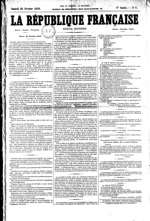 |
Title: La République française. Daily journal. Signed: the editors: F. Bastiat, Hippolyte Castille, Molinari. Appeared 26 February to 28 March. 30 issues. E-Text: 28 of the 30 issues are available in PDF. Comment: The day after the July Monarchy collapsed in late February Bastiat, Molinari, and Castille were on the streets of Paris with their own revolutionary magazine advocating free market ideas to the rioters in the streets. This is a fascinating piece of liberal history. Guillaumin Collection: French Classical Liberalism |
17. August 21: Humboldt, Ideen zu einem Versuch, die Gränzen der Wirksamkeit des Staats zu bestimmen (1851)
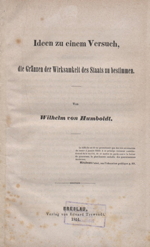 |
Title: Wilhelm von Humboldt, Ideen zu einem Versuch, die Gränzen der Wirksamkeit des Staats zu bestimmen (Some Ideas in an Attempt to determine the Limits of the Functions of the State) (Breslau: Heinrich Richte, 1851). E-Text: German version in HTML - [facs. PDF 12 MB] Comment: Humboldt's essay on "The Limits of State Action" is an early effort to define the boundaries of the limited classical liberal state. He wrote this as a series of essays in 1792 during the French Revolution a couple of which were published at the time. He did not publish the compelte book in his lifetime, perhaps fearing how radical it was now that he had become a seniour public servant in the Prussian education system. It was published in 1851 in German and was quickly translated into English in 1854, just in time to have an impact on John Stuart Mill who acknowledged Humboldt's influence on his thinking in On Liberty which was published in 1859. Guillaumin Collection: German Classical Liberalism |
16. August 17: A Foreword by Rose Wilder Lane to Bastiat's Social Fallacies (Economic Sophisms) (1944)
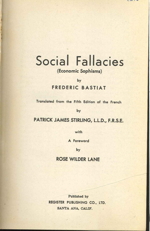 |
Title: Social Fallacies (Economic Sophisms) by Frederic Bastiat. Translated from the Fifth Edition of the French by Patrick James Stirling, L.L.D., F.R.S.E. with A Foreword by Rose Wilder Lane (Published by Register Publishing Co., Santa Ana. Calif. 1944). E-Text: Translator's Preface (Stirling), Publisher's Statement (Hoiles), Foreword (Lane) - HTML and facs. PDF 5 MB Comment: Rose Wilder Lane (1886-1968) was an American individualist and libertarian who was very important in the founding of the modern American libertarian movement in the mid-20th century. Lane wrote The Discovery of Freedom in 1943 and the following year this Preface for R.C. Hoiles' edition of Bastiat's Social Fallacies (Economic Sophisms). This was an important moment when Bastiat's free trade and free market ideas were re-introduced to America. In her foreword Lane provides a remarkable survey of the rise and fall and possible rise of liberty again over the previous 200 hundred years, and placed the work of Bastiat in the context of this historical movement. |
15. August 14: Frédéric Bastiat, Harmonies of Political Economy, trans. Stirling (1880).
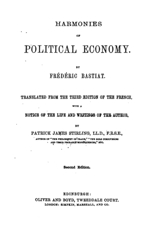 |
Title: Harmonies of Political Economy, by Frédéric Bastiat. Translated from the Third Edition of the French, with a Notice of the Life and Writings of the Author. Second Edition (Edinburgh: Oliver and Boyd, 1880). E-Text: Facimile of the 1880 vesion [PDF 12.2 MB] and an HTML version with links to earlier versions in facsimile. Comment: The first complete English edition of Bastiat's Economic Harmonies (1880). James Patrick Stirling translated the 1st ed. of Economic Harmonies in 1860 (the 1st 10 chapters of Bastiat's unfinished work appeared in Jan. 1850), the 2nd French edition of 1851 with 15 additional chapters from his papers and drafts which Stirling translated and published in 1870, and then this 1880 edition of the complete volume. Guillaumin Collection: French Classical Liberalism |
14. August 10: Adolphe Thiers, The Rights of Property; A Refutation of Communism and Socialism (1848).
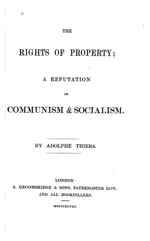 |
Title: Adolphe Thiers, The Rights of Property; A Refutation of Communism and Socialism [no name given for the translator] (London: R. Groombridge & Sons, 1848). E-Text: The English version in HTML with links to the facsimile PDFs (French and English versions) Comment: The attempt by the socialists in the Provisional Government after the February Revolution of 1848 in France led to a vigorous discussion about property rights and socialism when the socialists tried to enshrine a "right to a job" clause in the new constitution. Liberals like Bastiat and Molinari wrote pamphlets and books defending property and criticising socialism, as did liberal conservatives like the historian and politician Adolphe Thiers. In this book Thiers gives a very interesting defence of the right of self-ownership which is aLockean notion. Guillaumin Collection: French Classical Liberalism |
13. August 3: Yves Guyot, Le Libre-Échange international (1918).
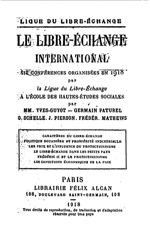 |
Title: Le Libre-Échange international. Six Conférences organisées en 1918 par la Ligue du Libre-Échange à l'École des Hautes Études Sociales par MM. Yves Guyot, Germain Paturel, G. Schelle, J. Pierson, Frédéric Mathews (Paris: Félix Alcan, 1918). E-Text: [PDF 8.3 MB] Comment: In 1911 the remnant of the French free traders formed a new Free Trade Association modelled on Bastiat's of 1846. Yves Guyot, the editor of the Journal des Économistes, was the President and their Manifesto was published there in 1911. A second Manifesto was published during WW1 in 1916 and a conference organised in January 1918 in order to assess the prospects for free trade as the war came to a conclusion. Guyot was not optimistic as he observed that when businessmen and financiers advise and cooperate with governments in the conduct of the war they become more interventionist than the careeer bureaucrats. He noted the existence of a stark antithesis between the interventionist and militarist oligarchies which controlled the governments on both sides and the supporters of free trade who wanted to destroy the power of these oligarchies by introducing a policy of international free trade (pp. 34-35). Guillaumin Collection: War and Peace |
12. July 29: Bastiat, Molinari, et al., Jacques Bonhomme (June, 1848).
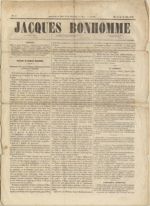 |
Title: Jacques Bonhomme, (Paris: 11 June - 13 July, 1848). E-Text: [to come - see this page in the meantime]
Comment: Jacques Bonhomme was a short lived journal which was written and distributed on the streets of Paris during the 1848 Revolution by 4 economists, Gustave de Molinari, Charles Coquelin, Alcide Fonteyraud, and Joseph Garnier. It appeared approximately weekly with 4 issues between 11 June to 13 July. It was forced to close by the violent repression by the army of the 'June Days' uprising. Guillaumin Collection: French Classical Liberalism |
11. July 20: Francis W. Hirst, The Political Economy of War (1915).
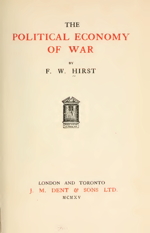 |
Title: Francis W. Hirst, The Political Economy of War (London and Toronto: J.M. Dent & Sons, 1915) E-Texts: [PDF 13MB] Comment: Francis Hirst (1873-1953) was an English classical liberal author and book editor who was the editor of The Economist from 1907 to 1916. He wrote biographies of William Gladstone, Adam Smith, and John Morley and many books on economics. While editor of the Economist he published the first book devoted to the "political economy of war" which drew upon the ideas of Adam Smith and Frédéric Bastiat. Guillaumin Collection: War and Peace |
10. July 20: Poems by Wilred Owen (1921).
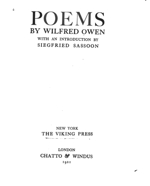 |
Title: Poems by Wilred Owen, with an Introduction by Siegfried Sassoon (New York: The Viking Press; London: Chatto & Windus, 1921). E-Texts: [PDF 436KB] Comment: Wilfred Owen is the best known of the English war poets who fought in WW1. He died on 4 November 1918 one week before the Armistice ended the war. This collection of his war poerty was published by friend Siegfried Sassoon who was also a poet. My favourites in this volume are "Parable of the Old Men and the Young" and "Dulce et Decorum est". His unfinished preface is also very moving. Guillaumin Collection: Literature |
9. July 19: Jean de Bloch, The Future of War (1903).
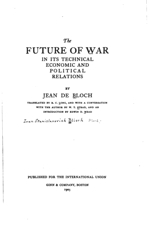 |
Title: Jean de Bloch, The Future of War in its Technical, Economics, and Political Relations. Translated by R.C. Long, and with a Conversations with the Author by W.T. Stead, and an Introduction by Edwin D. Mead (Boston: Published for the International Union, Ginn and Company, 1903). E-Texts: [PDF 8MB] Extracts in HTML: VI. Probable Losses in Future Wars and VII. Militarism and its Nemesis [with data tables] Comment: This is the 1 vol. abridgement of his 6 vol. work originally published in Russian and German in 1899. Guillaumin Collection: War and Peace |
8. July 19: Johann von Bloch (Jean de Bloch), Der Krieg (6 vols.) (1899).
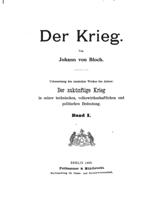 |
Title: Johann von Bloch (Jean de Bloch), Der Krieg. Uebersetzung des russischen werkes des Autors: Der zukünftige krieg in seiner technischen, volkswirtschaftlichen und politischen Bedeutung (Berlin: Puttkammer & Mühlbrecht, 1899). E-Texts:
Comment: Jean de Bloch (1836-1902) was a Polish born banker and railway financier who lived and worked in Russia. The quick Prussian defeat of France in 1870 led him to pursue a scientific study of what a modern war might look like in the near future. This 6 volume work is remarkably prescient in many of his predictions of what actually transpired in WW1 . A 1 vol. abridgement was published in English and a 4 vol. one in French. The Germans got the full 6 vol. treament but ignored it. The graphs and statistical tables about the destructiveness of modern weaponry and his predicted death rates are especially interesting. Guillaumin Collection: War and Peace |
7. July 17: Yves Guyot, Les Causes et les conséquences de la Guerre (1915).
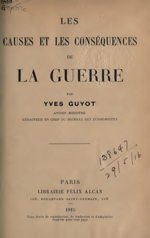 |
Title: Yves Guyot, Les Causes et les conséquences de la Guerre. (Paris: Félix Alcan, 1915). E-Text: [PDF 23MB] Comment: Guyot wrote a series of 9 aticles for the Journal des Économistes (of which he was the editor) as the war was unfolding between August 1914 and April 1915 [French version [PDF 16MB]. This was expanded and published as a book which was translated into English. It provides an interesting insight into the minds of the last remaining classical liberals in France before they were marginalised after the war. Guillaumin Collection: French Classical Liberalism and War and Peace |
6. July 16: Yves Guyot, The Causes and Consequences of the War (1916).
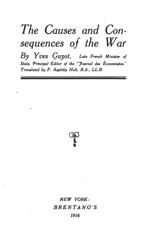 |
Title: Yves Guyot, The Causes and Consequences of the War. By Yves Guyot, Late French Minister of State. Principle Editor of the "Journal des Économistes." Translated by F. Appleby Holt, B.A., LL.B. (New York: Brentanbo's, 1916). E-Text: [PDF 8MB] Comment: Guyot wrote a series of 9 aticles for the Journal des Économistes (of which he was the editor) as the war was unfolding between August 1914 and April 1915 [French version [PDF 16MB]. This was expanded and published as a book which was translated into English. It provides an interesting insight into the minds of the last remaining classical liberals in France before they were marginalised after the war. Guillaumin Collection: French Classical Liberalism and War and Peace |
5. July 14: Élie Halévy, La Formation du Radicalisme philosophique III: Le Radicalisme philosophique (1904).
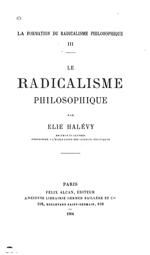 |
Title: Élie Halévy, La Formation du Radicalisme philosophique III: Le Radicalisme philosophique (Paris: AF. Alcan, 1904). E-Text: [PDF 14 MB]. Comment: The third volulme of a three volume work on the movement for liberal reform in England, known as the Philosophic Radicals, in last part of the 18th century and the first 3 decades of the 19th. Guillaumin Collection: English Classical Liberalism |
4. July 14: Élie Halévy, La Formation du Radicalisme philosophique II: L'Évolution de la doctrine utilitaire de 1789 à 1815 (1901).
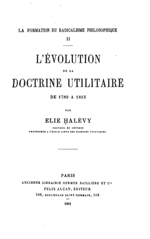 |
Title: Élie Halévy, La Formation du Radicalisme philosophique II: L'Évolution de la doctrine utilitaire de 1789 à 1815 (Paris: F. Alcan, 1901). E-Text: [PDF 11.1 MB]. Comment: The second volulme of a three volume work on the movement for liberal reform in England, known as the Philosophic Radicals, in last part of the 18th century and the first 3 decades of the 19th. Guillaumin Collection: English Classical Liberalism |
3. July 14: Élie Halévy, La Formation du Radicalisme philosophique I: La jeunesse de Bentham (1901).
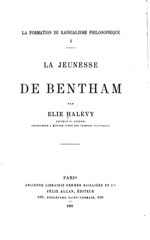 |
Title: Élie Halévy, La Formation du Radicalisme philosophique I: La jeunesse de Bentham (Paris: F. Alcan, 1901). E-Text: [PDF 13.8 MB]. Comment: The first volulme of a three volume work on the movement for liberal reform in England, known as the Philosophic Radicals, in last part of the 18th century and the first 3 decades of the 19th. Guillaumin Collection: English Classical Liberalism |
2. July 14: Élie Halévy, Thomas Hodgskin (1787-1869) (1903).
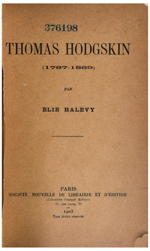 |
Title: Élie Halévy, Thomas Hodgskin (1787-1869) (Paris: Société Nouvelle de librairie et d'édition, 1903). E-Text: [PDF 3.8 MB]. Comment: The first biography of the life and thought of Hodgskin was written by a Frenchman who also wrote an imporatnt 3 volulme history of the Philosiophic Radicals who were influenced by Bentham's theories, most notably James and John Stuart Mill. Guillaumin Collection: English Classical Liberalism OLL: Thomas Hodgskin |
1. July 13: Thomas Hodgskin, Labour Defended against the Claims of Capital (1825).
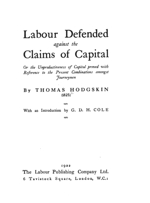 |
Title: Thomas Hodgskin, Labour Defended against the Claims of Capital. Or the Unproductiveness of Capital proved with reference to the present Combinations amongst Journeymen. With an Introduction by G.D.H. Cole (London: The Labour Publishing Company Ltd., 1825). E-Text: [PDF 4.9 MB]. Comment: Claimed by many socialists as "one of them" Hodgskin is in fact a radical individualist and supporter of free trade and free markets. Guillaumin Collection: English Classical Liberalism OLL: Thomas Hodgskin |
2013
|
|||||||||
|
|||||||||
2012
|
|
|
|
2011
[A Schematic Diagram showing the Institutions and Class Structure of the State - see a larger version in JPG or PDF] |
|
|
|
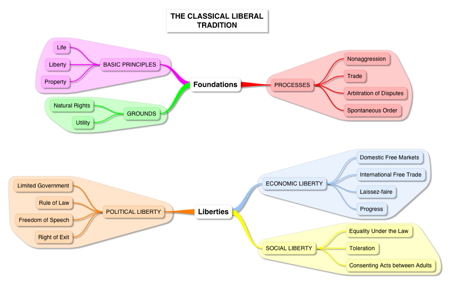
This is a "concept map" I developed for a series of lectures on the history of the classical liberal tradition. [See a larger version in PDF].
The Centennial of the Death of Gustave de Molinari
(1819-1912): Founding Father of the Anarcho-Capitalist Tradition
GUSTAVE DE MOLINARI (1819-1912) Commemorating the Centennial of his death at 92 years of age on 28 January, 1912 in Adinkerke, Belgium. [Obit] |
|
Richard Cobden & Frédéric Bastiat urged
us to demand "free trade in everything" John Locke's motto was "Pax ac Libertas". Molinari's was "La Liberté et la Paix". Mine is "In vino libertas".
|
|
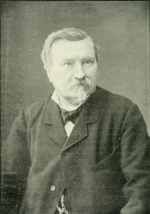 |
|
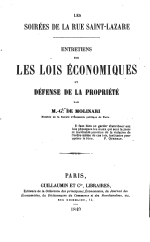 |
|
French Liberals on Ridiculing & Exposing
State Power
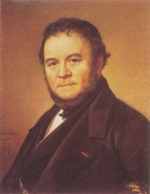 |
Stendhal on power & "the empire of ridicule":
|
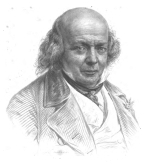 |
Béranger on ringing the bell of power:
|
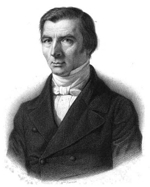 |
Bastiat on the State as a great fiction:
|
|
|

